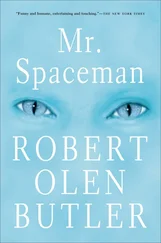For all the strident criticism of Hatcher in Deborah’s books, which he did read out of self-defense, painful though it was, he still needs to knock on this door. He feels in her books she got him wrong, but he suspects that the actual process of writing helped create the distortions. In person, perhaps he can get at something legitimate she knows about him. Because his mother also got him wrong, of course. As much as part of him wants to believe she didn’t, she did. He was — is — far from perfect. You think? his voice below his thinking suddenly says. You’re in Hell, asshole. I’d fucking say so. Hatcher knocks at Deborah’s door.
There is no answer. Hatcher is afraid she’s out somewhere in the street. He knocks again. Nothing.
“Deborah?” he says, loud, over the music all around him.
Nothing.
“Deborah?” he calls, louder.
“She’s not in there,” a woman’s voice says, just behind Hatcher.
Hatcher turns. She’s very old and stooped and bony and bewhiskered and her skin is jaundiced the color of a heavy smoker’s teeth. She sees Hatcher’s tie, and her eyes narrow and she pulls back a bit.
“It’s all right,” Hatcher says. “I was married to her.”
“Which demon of a husband were you?” she says.
“Her second.”
“The one on the television set.”
“That one.” Hatcher did not keep up with Deborah after they split, though he was aware she’d married and divorced once more after him, having also had a too-young marriage before him. He feels a brief pulse of pleasure at her apparent ranting about husbands other than him. He wishes they’d rated books. “Do you know where she is?” he says.
“She threw herself off her balcony about five minutes ago,” the old woman says.
“What?” His first thought is that she did it in response to seeing him naked on TV.
“I live next door,” the old woman says. “She does this almost every day.”
“Thanks,” Hatcher says, telling his inner voice to stuff it, as it is about to give him a hard time for thinking his naked body could inspire a suicide for any possible reason. He focuses on Deborah lying broken outside and he moves off quickly.
The old woman watches him go: Leap, yes leap, my friend, I have leapt too, we all of us in the balcony rooms leap and leap and O if I could but seal off that end of my room, the terrible open end, the wide sky beyond, I dream of my cell in the convent, the narrow walls, the high, small, knifeprick of sky, the bed, the bowl, the cup, only these. And I remember — though it has been a long long time now — the days of my one husband, my own demon, the baron of… where? Sussex. Yes, some baron of Sussex. It is torture, this fading of my memory. O if I could but picture his face more clearly so I could hate him all the more. My husband who put me aside with lies so I was left with only death or the cloister before me. And the ringing takes up, the ringing in my head: the Sanctus bell, the Host rising, the only man’s body for my last many years, His holy body. He was my last husband, who looked the other way, I always thought, whenever I laid my mortal body down with the body of my Abbess in the warming house in winter where we covered ourselves in ash, and in the granary in summer where the wheat clung to us in our sweat. But even my last husband put me aside in the end, in spite of my prayers in the final moments to be forgiven. And though it’s true that even as I prayed, if I’d had the strength and the chance I would have sought her sweet kisses once more, He should still have forgiven this body of mine with its terrible weakness, for His Father created my body this way and if His Father could not resist creating it thus, how could I resist thus living in it?

The hundred apartment buildings in the housing project float on a sea of concrete. Hatcher rounds the corner of Deborah’s building and enters the fifty-yard-wide margin reachable by jumpers from the balconies, a place called The Landing Strip by the denizens. It is splashed with dark stains. The crowds between the buildings mill about in clusters that shape up and fist fight or knife fight or simply scream and foam and rage and then break apart and form new clusters, always stumbling about in the shadow of the buildings, but never ever moving into The Landing Strip. So from the moment Hatcher turns the corner, he sees Deborah up ahead. He rushes toward her.
She lies broken in a widening pool of blood, her cheek pressed hard against the concrete, her eyes open, seemingly sightless but blinking, her arms at elbow-flared angles, her legs cracked and splayed but bent under her at the knees so that her back and butt are lifted slightly. Her left hand is twitching. Hatcher arrives beside her and kneels in her blood so he can extend a hand and gently palm the side of her head just above her ear. Her hair was always soft and thick, and it still is, though it is gray. She did not kill herself at the end of her mortal life. That she’s doing this now, over and over, makes his hand tremble against her.
“Debbie,” he says.
Her eyes move slightly toward him, and they close.
He does not know how to take this. But he keeps his hand on her, even as her blood continues to gather around his knees.
“I’m sorry,” he says.
Her eyes move beneath her closed lids as if she were dreaming. Hatcher and Deborah stay like this for a long while, until finally her blood stirs around him, even drawing itself out of his pants legs, and her body begins to jerk and shiver and the blood flows back into her and her body straightens and mends, and Hatcher takes his hand from her head as she moves and slowly flexes her limbs and finally gathers herself into a sitting position. He shifts from his knees and sits beside her.
She says, though softly, “Leave it to you to show up when I’m at my worst.”
“It was unintentional,” he says.
“It was instinctive,” she says.
She still isn’t sounding as angry as Hatcher would expect. But he has no answer for this.
“Sorry for what?” she says.
“Whatever I did to us.”
Deborah humphs at this. “I hear that in the hallways around here once in a while, and it always surprises me.”
“Hear what?”
“‘I’m sorry.’”
Hatcher looks away, beyond the Landing Strip. There are skirmishes all over. Immediately before him, several gangs of young men, black and white, have been forced to swap some of their past styles and are murderously fighting over it: the whites are in the zoot suits and the hoodies and the sagging pants and the bucket hats and the neck bling and the do-rags and the dreadlocks, and the blacks are in the leisure suits and the chinos and the boaters and the Hush Puppies and the ascots and the crew cuts. Beyond them are old people jostling and wailing and cursing. And Hatcher recognizes an instance of what he has come to understand as his own arrogant self-absorption, for it never occurred to him that others in Hell are apologizing. Surely Hell is never having to say you’re sorry. But Deborah apparently has heard it — no doubt because here in the projects, the crowds are always upon her — and so, once in a while, someone says I’m sorry, even as they think Satan is listening in, even as they expect to be punished for it. Hatcher’s chest fills with a complicated warmth about these people before him now, though they are fighting and cursing each other. They are struggling on, even in Hell, and sometimes they regret what they do or what they have done, and they say so. Hatcher is breathless now over all of them, and he turns to Deborah and he lifts his hand to touch her head again. She bats his hand away, though lightly.
Читать дальше













